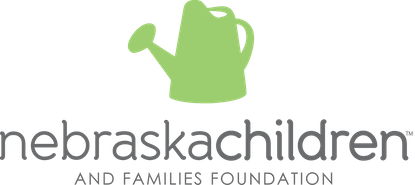For Nebraska Children, evaluation is work that generates new knowledge and is focused on answering questions about how, why, and to what extent objectives or goals are achieved. Because Nebraska Children believes that communities are the most powerful vehicle available for delivering positive change for our state’s kids, much of Nebraska Children’s evaluation efforts focus on community-level prevention work. For the same reason, Nebraska Children is also invested in “setting communities up for success” when it comes to evaluation work. What this looks likes varies from community to community; however, commonalities include:
- Facilitation of community conversations to identify and commit to shared goals and related metrics,
- Provision of ongoing, tailored, technical assistance from Nebraska Children’s staff and external evaluation partners related to data collection, data interpretation, and data use, and
- For the core components of Nebraska Children’s work (for example, the collective impact approach and specific prevention strategies), development and continuous improvement of processes designed to ease the burden of data collection, while maintaining and ensuring data quality.
Supported by Nebraska Children’s external evaluation partners, communities collect both implementation and outcome data to answer evaluative questions related to the collaborative functions of locally-based prevention systems as well as the strategies associated with these systems. Furthermore, for the evaluation of core prevention strategies, Nebraska Children has adopted Results-Based Accountability as a data-driven decision-making process. See below for reports related to Nebraska Children’s Community Well-Being Work as a whole, as well as reports on specific prevention strategies.
Community Well-Being – Evaluation Reports
- Community Well-Being Evaluation Report (Fall 2021)
- Community Well-Being 6-Month Progress Report (Spring 2021)
- Community Well-Being Evaluation Report (Fall 2020)
- Highlights from the Community Well-Being Evaluation Report (Fall 2020)
- Community Well-Being 6-Month Progress Report (Spring 2020)
- Community Well-Being Evaluation Report (Fall 2019)
- Community Well-Being Evaluation Report (Fall 2018)
- Promoting Safe and Stable Families (Fall 2017)
- Promoting Safe and Stable Families (Fall 2016)
Nebraska Children Initiatives – Evaluation Reports
Communities for Kids
- Communities for Kids Plus Evaluation Report (2022)
- Communities for Kids Annual Report (2021)
- Communities for Kids Plus Evaluation Report (2021)
- Communities for Kids Focus Group Report (2019)
- Communities for Kids Focus Group Report (2018)
Connected Youth Initiative:
- Highlights from the Nebraska Expectant Parenting Grant Evaluation Report (2020)
- Nebraska Expectant and Parenting Grant – Final Evaluation Report (2020)
- Evaluation of the Connected Youth Initiative: Final Report (prepared by WestEd for Social Innovation Fund - 2020)
- Highlights from Connected Youth Initiative Report for Social Innovation Fund (2020)
- Statewide Transitional Services Survey Report (April 2019 results)
- Statewide Transitional Services Survey Report (October 2018 results)
- Statewide Transitional Services Survey Report (October 2017 results)
Rooted in Relationships
- Rooted in Relationships Evaluation Report – Executive Summary (2021)
- Rooted in Relationships Evaluation Report (2021)
- Highlights from the Rooted in Relationships Evaluation Report (2020)
- Rooted in Relationships Evaluation Report – Executive Summary (2020)
- Rooted in Relationships Evaluation Report (2020)
- Highlights from the Circle of Security Parenting Evaluation Report (2019-2020)
- Circle of Security Parenting Evaluation Report (2019-2020)
- Rooted in Relationships (2017-18 report)
Sixpence
- Sixpence Annual Evaluation Report (Fall 2020)
- Highlights from the Sixpence Evaluation Report (Fall 2020)
Core Strategies within Community Well-Being – Evaluation Reports
- Community Response (Spring 2020)
- Community Café Evaluation Report
- Community Response (Fall 2018)
- Community Response (Fall 2019)
Evaluation Tools

